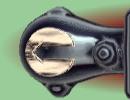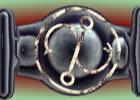
Legend of GianniDiana as Giving Beauty and Restoring Strength |

This legend contains much that is very curious; among other things an
invocation to the firefly, one to Mefitia, the goddess of malaria, and a long
poetic prophecy relative to the hero. It is evidently full of old Latin
mythologic lore of a very marked character. The whole of it may be found in a
forthcoming work by the writer of the book, entitled, “
The Unpublished
Legends of Virgil.” London, Elliot Stock.
Diana hath power to do all things, to give glory to the lowly, wealth to the poor, joy to the afflicted, beauty to the ugly. Be not in grief, if you are her follower; though you be in prison and in darkness, she will bring light: many there are whom she sinks that they may rise the higher.
There was of old in Monterom a young man so ugly that when a stranger was passing through the town he was shown this Gianni, for such was his name, as one of the sights of the place. Yet, hideous as he was, because he was rich, though of no family, he had confidence, and hoped boldly to win and wed some beautiful young lady of rank.
Now there came to dwell in Monteroni a wonderfully beautiful biondina, or blonde young lady of culture and condition, to whom Gianni, with his usual impudence, boldly made love, getting, as was also usual, a round No for his reply.
But this time, being more than usually fascinated in good truth, for there were influences at work he knew not of, he became as one possessed or mad with passion, so that he hung about the lady’s house by night and day, seeking indeed an opportunity to rush in and seize her, or by some desperate trick to master and bear her away.
But here his plans were defeated, because the lady had ever by her a great cat which seemed to be of more than human intelligence, and, whenever Gianni approached her or her home, it always espied him and gave the alarm with a terrible noise. And there was indeed something so unearthly in its appearance, and something so awful in its great green eyes which shone like torches, that the boldest man might have been appalled by them.
But one evening Gianni reflected that it was foolish to be afraid of a mere cat, which need only scare a boy, and so he boldly ventured on an attack. So going forth, he took a ladder, which he carried and placed against the lady’s window. But while he stood at the foot, he found by him an old woman, who earnestly began to beg him not to persevere in his intention. “For thou knowest well, Gianni,” she said, “that the lady will have none of thee; thou art a terror to her. Do but go home and look in the glass, and it will seem to thee that thou art looking on mortal sin in human form.”
Then Gianni in a roaring rage cried, “I will have my way and my will, thou old wife of the devil, if I must kill thee and the girl too!” Saying which, he rushed up the ladder; but before he had opened or could enter the window, and was at the top, he found himself as it were turned to wood or stone, unable to move.
Then he was overwhelmed with shame, and said,
“Ere long the whole town will be here to witness my defeat. However, I will make one last appeal.” So he cried: —
“Oh, vecchia! thou who didst mean me more kindly than I knew, pardon me, I beg thee, and rescue me from this trouble! And if, as I well ween, thou art a witch, and if I, by becoming a wizard, may be freed from my trials and troubles, then I pray thee teach me how it may be done, so that I may win the young lady, since I now see that she is of thy kind, and that I must be of it to be worthy of her.”
Then Gianni saw the old woman sweep like a flash of light from a lantern up from the ground, and, touching him, bore him away from the ladder, when lo! the light was a cat, who had been anon the witch, and she said: —
“Thou wilt soon set forth on a long journey, and in thy way thou wilt find a wretched worn-out horse, when thou must say: —
| Italiano | Translation |
|---|---|
|
«‘Fata Diana! Fata Diana! |
“‘Fairy Diana! Fairy Diana! Fairy Diana! |
“Then will we enter in a great hall where thou wilt see many beautiful ladies who will try to fascinate thee; but let thy answer ever be, ‘She whom I love is her of Monteroni.’
“And now, Gianni, to horse; mount and away!” So he mounted the cat, which flew as quick as thought, and found the mare, and having pronounced over it the incantation, it became a woman and said: —
| Italiano | Translation |
|---|---|
|
“In nome della Fata Diana! |
“In the name of the Fairy Diana! |
After this he found the goat and conjured it in like manner, and it replied: —
“In the name of the Fairy Diana!
Be thou attired more richly than a prince!”
So he passed to the hall, where he was wooed by beautiful ladies, but his answer to them all was that his love was at Monterone.
Then he saw or knew no more, but on awaking found himself in Monterone, and so changed to a handsome youth that no one knew him. So he married his beautiful lady, and all lived the hidden life of witches and wizards from that day, and are now in Fairy Land.

As a curious illustration of the fact that ithe faith in Diana and the other deities of the Roman mythology, as connected with divination, still survives among the Italians of “the people,” I may mention that after this work went to press, I purchased for two soldi or one penny, a small chapbook in which it is shown how, by a process of conjuration or evocation and numbers, not only Diana, but thirty-nine other deities may be made to give answers to certain questions. The work is probably taken from some old manuscript, as it is declared to have been discovered and translated by P. P. Francesco di Villanova Monteleone. It is divided into two parts, one entitled Circe and the other Medea.
As such works must have pictures, Circe is set forth by a page cut of a very ugly old woman in the most modern costume of shawl and mob-cap with ribbons. She is holding an ordinary candlestick. It is quite the ideal of a common fortune-teller, and it is probable that the words Maga Circe suggested nothing more or less than such a person to him who “made up” the book. That of Medea is, however, quite correct, even artistic, representing the sorceress as conjuring the magic bath, and was probably taken from some work on mythology. It is ever so in Italy, where the most grotesque and modern conceptions of classic subjects are mingled with much that is accurate and beautiful — of which indeed this work supplies many examples.
  
|